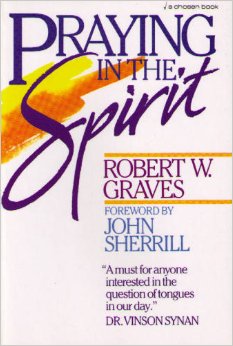Praying in the Spirit: What They’re Saying Now: Some Non-Charismatics Reevaluate Tongues
The first chapter of the Praying in the Spirit Series.

Robert W. Graves wrote Praying in the Spirit (Chosen Books) in 1987, when it received great reviews from a number of Pentecostal/charismatic scholars and leaders including John Sherrill, Dr. Vinson Synan, Dr. Gordon Fee, Dr. William Menzies, Dr. Howard Ervin, Dr. Walter Martin, and Dr. Stanley Horton. It is the great privilege of the Pneuma Review to republish it here.
Bow-tied waiters glide across the plush red carpet. Sharply dressed gentlemen and elegantly appareled ladies devour crispy bacon, spicy sausage, and fluffy scrambled eggs. The smiling couple beside you probably has a college degree or two. Perhaps they are doctors, dentists, or lawyers. After the meal and some sprightly and cordial conversation among guests, the master of ceremonies steps behind the podium and introduces the morning’s speaker: a prominent businessman, a well-known politician, a college professor, he might be any of these.
This is a typical breakfast meeting of the Full Gospel Business Men’s Fellowship International, the Pentecostal thrust to the affluent. Pentecostalism’s story is truly one of rags to riches, of ostracism to respectability. The storefront church with its shoebox pulpit is now the largest church on Main Street.
From its unlikely beginnings in 1906, who would have foretold the prominence that the Pentecostal movement would obtain, both socially and theologically?
There are Pentecostals alive today who remember vicious verbal (as well as physical) attacks upon the infant Pentecostal movement. According to Frank Ewart, Dr. G. Cambell Morgan called the movement “the last vomit of Satan” (quoted in R.M. Anderson, p. 142). Harry A. Ironside said he “could count scores of persons who had gone into utter infidelity because of it …. Many more… lapsed into insanity…. In the last few years hundreds of holiness meetings all over the world have been literally turned into pandemonium’s where exhibitions worthy of a madhouse or of a collection of howling dervishes are held night after night. No wonder a heavy toll of lunacy and infidelity is the frequent result” (Synan, Aspects, pp. 105-106). The movement “was wicked and adulterous,” according to Dr. Dixon. And R.A. Torrey claimed Pentecostalism was founded by a Sodomite (quoted in R.M. Anderson, p. 142). The distinctive practice of speaking with other tongues reminded Sir Robert Anderson of Isaiah’s wizards that chirp and mutter (p.24).
But even those who find little or no good in today’s charismatic renewal have never denied that something is going on. A doctor devotes a book to explaining the phenomenon of tongues (glossolalia) psychologically. In a larger volume a linguist concludes that it is a learned response. That something happens has never been denied, but the anti-Pentecostal evaluation and interpretations of that something has radically changed.
Respected church leader and critic of the charismatic renewal John R. W. Stott writes, “There can be no doubt that God has used this movement to bring blessing to large numbers of people” (p.7). Merrill Unger wrote three books refuting charismatic practice and doctrine. In one of those books he stated that “the charismatic revival … represents a sincere quest for God’s spiritual best in the believer’s life” (New, p. 2). Joseph Dillow testifies, “I know many men whom I admire highly who speak in tongues. Furthermore, I’m not aware of anything but good that has come from it in some of their lives” (pp. 163-64).
Category: Spirit, Winter 1999


